 You still don’t know us properly; Whoever makes the slightest move against us to defame us, we will cut off his head.
You still don’t know us properly; Whoever makes the slightest move against us to defame us, we will cut off his head.
The words of a member of the Taliban
By: Sara Balkhi
Translated by: Mohammad Rezaie
Date: From August 2021 to October 2022
The restrictions that entered Afghanistan at the same time as the Taliban and extended Pakistan’s hand more than before in the administrative-security structures of the country, opened a new window to the murders and secret and open terrors managed against Afghan citizens.
Violation of citizens’ human rights, repression, discrimination and deadly restrictions on the daily life situation have caused a number of Balkh residents, especially women, to launch protest marches against this situation and demand the restoration of their civil dignity and fundamental rights. However, in order to curb these protests, the Taliban have tried to use their traditional methods such as repression accompanied by violence, torture, imprisonment and killing.
In the present report, we are dealing with two large protest marches of women and girls in Balkh, both of which were violently suppressed and many protesters were arrested, imprisoned, tortured and killed.

1. On 4 September 2021, notices were published by civil activists of Mazar-e-Sharif in the media and social networks and WhatsApp groups about the launch of a women’s protest in Balkh against the Taliban government and the government of Pakistan, due to the employment of Pakistani diplomats in Afghan offices.
Ziwa Wafaei, a women’s rights activist in Balkh, told the Silk Way Weekly that she wanted to participate in a protest march; But her family opposed her and did not allow her to join the protestors. Ms. Wafaei says that she found out through her friends that nearly 70 boys and girls participated in this protest against the Taliban and the government of Pakistan. She adds: “The participants in this peaceful march did not demand anything but their rights; But this protest movement was turned violent by the Taliban and 40 girls and boys participating in this march were arrested by the Taliban forces”.

After arresting the protestors in Mazar-e-Sharif city, the Taliban threatened the journalists who came to the place of the protestors to cover the news of the march, that if this news is published anywhere, they will kill all of them who publish the news. Therefore, reporters could not mediate this news; But after three-four months, some of the details of this news were published by the girls who were arrested in some media.
Women times media, publishing a report on October 9, 2022, quoting an eyewitness in Balkh, wrote that following two protests on the 6 September and October 2021, the bodies of 115 women were transferred to one of the hospitals in the city of Mazar-i-Sharif.
A reliable source told the Silk Way Weekly that she spoke with one of her friends named Sakineh, who participated in the protest on 6 September 20021, in the city of Mazar-e-Sharif, after being released from the Taliban prison. She, who saw Sakineh closely, said: My colleague Sakinah, who worked in one of the private clinics during the Republic government and lost he job after the Taliban returned to power, was also arrested by the Taliban forces for participating in this protest march and was detained for two months under torture in prison.”

This source adds; On the day Sakinah was released from the Taliban prison on bail, she went to see her and saw that she was not in a good mood. Sakinah shares with her friend the oppression she and the other girls experienced in prison: “We were 20 girls in prison in a dark room that smelled of blood. We did not know about the rest of the girls in which room they were imprisoned. A woman was brutally torturing us with whips and electric shocks. “We were sexually assaulted many times by the Taliban.”
According to the source, the blackness and bruises on Sakinah’s body showed that she was brutally tortured in prison. Sakinah continued: “In this prison, women were brutally tortured day and night, and the screams of women could be heard from the room next to us. Three of our colleagues died in front of my eyes due to severe torture. This source adds that Sakinah’s story from the Taliban prison was very sad.
When this source suggests to Sakinah to let what happened to her and her associates to be published on the media, Sakinah’s brother opposes this and tells her: “This case concerns us. Can the media erase this stain of infamy on our family”?
The source continues: “In response to him [Sakinah’s brother], I said that if the oppression that happened to Sakeena is not made public, it will be a great punishment for her.” After hearing this [speech], Sakineh’s brother insulted me and kicked me out of his house.”

The source says that a week later, she heard the news of Sakineh’s death: “Shee was shot dead by his brother. The reason for that was to erase the infamous stain that sat on the lap of Sakinah’s family after she was caught and tortured. According to the source, Sakinah’s brother, besides not being punished in connection with his sister’s murder, also joined the ranks of the Taliban and now works as the Taliban’s administrative deputy in Balkh.
Narges was another protester who spent three days in Taliban prison. A reliable source told the Silk Way Weekly: “After her release, the Taliban asked her to marry one of the members of this group; But Narges did not accept this offer. The source adds that after two days, the Taliban went behind the door of 22-year-old Nargis’ house and forced her to marry one of their people. “Narges was almost 22 years old and was a first-year student of the Faculty of Economics in one of the private universities. Narges’ mother said that after months passed, she could not see her daughter and she does not know if she is alive or not”.
The findings of the Silk Way Weekly show that Sakineh and Narges belonged to the Balkh Hazara ethnic group.
2. Local sources in Balkh reported on 3 October 2022 said that the Taliban arrested a number of female protesters who had marched in the city of Mazar e Sharif in response to the attack on the Kaj school in the west of Kabul – 30 Spet 2022 – and transferred them to an unknown place. have given. According to this report, the Taliban broke the cell phones of the girl protesters and beat some of them severely.
Few hours before the arrest of the protesters in Mazar-e-Sharif by the Taliban, the girls from the Balkh University dormitory also told the media that the Taliban had completely closed the gate of the dormitory on them, so that they could not join the protesters.
Local sources added that the Red Taliban faction in Balkh transferred dozens of female protesters who were students to an unknown location after forcing them into a military ambulance. At the same time as this incident, one of the local sources told the Silk Way Weekly that the Taliban told the detained girl protesters that they will not be released without the guarantee of their families. According to this report, although the Taliban prevented female students from leaving by locking the dormitory door and the exit doors of Balkh University; But the female students outside the dormitory had poured into the streets alone and chanted the slogan “Stop the Genocide of Hazaras”. The female students of Balkh University had called to launch their protest march.
ZiWa Wafaei, one of the participants of the 3 October 2021 protest march in the city of Mazar-e-Sharif, told the Silk Way Weekly: “On the morning of Monday, October 3, 2021, the city of Mazar-e-Sharif took on a military appearance, as if a coup had taken place. The Taliban had stationed a military vehicle in every street and their soldiers could be seen everywhere. Mrs. Wafaei adds that after the deadly suicide attack on the Kaaj Educational Center in the west of Kabul, in which 58 students were killed and nearly 126 others were injured, they held a protest rally: “A group of women and I had spread the notices of the protest gathering online a few days ago. Our protest was against the targeted killing of the Hazara people, the widespread lack of women’s rights, their removal from important social structures, and the banning of girls from education”.
According to Ms. Vafaei, after learning that girls are holding a protest march, the Taliban decide that they should suppress these protests: “We were supposed to start a protest rally from Balkh University; But the Taliban were aware of our plan; They surrounded the university and locked the female students in the dormitory. Inevitably, we determined another place to hold the protest rally. According to Wafai, each of the girls put their slogans in their sleeves and passed the Taliban checkpoints.
The protest of girls in Balkh makes the Taliban angry and the fighters of this group decided to suppress the protest gathering. Mrs. Wafaei says: “It was around 09:00 in the morning when we started the protest; We were nearly 50 women and mostly young girls. Beside us, six young boys from the students of Balkh University were also present. According to her, in a year of Taliban rule, this was the first time that men stood next to female protesters and chanted the slogan of stopping the genocide of the Hazaras with them around the city.
“The roads were full of men and many of them chased us away with insults and humiliation. The Taliban were shocked to see us, as if we attacked them with guns and cannons. While we only had papers in our hands on which our slogans were written. Dozens of Taliban armed forces surrounded us in the center of the city.
Threatening and beating protesters
According to Ms. Wafaei, the Taliban first want to arrest the boy protesters in order to suppress the 3rd August 2022 protest march in Mazar-i-Sharif. But they manage to escape before being caught. After that, the Taliban go to the girls and threaten, beat and arrest them. Ms. Wafaei continues: “A member of the Taliban approached us and asked: What is your problem that you are screaming on the road?” Then he said: You are a woman and you should be at home; What are you doing here on the road? Wafai, as a representative of the protest gathering, tells this Taliban member: “Give us the opportunity to read our resolution to you, and you, who claim to be in power, are obliged to hear our protest.” Talib aims his weapon at Mrs. Wafai; But “I read the resolution in which I condemned the exclusion of women and girls from education and work and the genocide of the Hazaras.” Ms. Wafaei had read the resolution halfway through a member of the Taliban got angry and threatened her: “If you keep going, I’ll shoot.” Ms. Wafaei continued her words: “A few more words after I continued, the Taliban commander hit me with the butt of his gun. At the request of my colleagues, I stopped reading the resolution. I told the girls to all go to our houses”; But the Taliban forces did not allow the girls to go to their homes. The commander of the Taliban told the girls: “Don’t move”!
When the Taliban did not let the female protesters go to their homes, Mrs. Wafai says to the Taliban commander: “What crime are you detaining us and keeping us here for?” Our protest was peaceful and ended; Now we have to go home.” She, however, receives a shocking response from the Taliban: “You still don’t know us properly; “Whoever makes the slightest move against us and to defame us, we will cut off his head.” The Taliban militia further said: “Wait right here on the side of the road”!
After a few moments of the girl protesters being surrounded in Mazar-e-Sharif, the Badri military unit – a special unit of the Taliban, some of whose members are suicide bombers – comes to the place of the girls’ protest gathering. Mrs. Wafai stands in front of the suicide bombers of the Taliban and says to them: “Did we come to you with cannons and guns when you didn’t see these existing forces as enough and asked for your Badri unit?” We don’t have anything else except a slogan sheet. According to Ms. Wafaei, the Taliban told her that people like her should be killed: “We are the enemy of prostitutes like you, and you should be killed.” Because all the corruption is under your feet and those like you, and you started these protests yourself.”
Arresting and the torturing protesters
Mrs. Wafai says; While the girl protesters who were surrounded by the Taliban wanted to return to their homes peacefully, the Taliban commander ordered his forces to force the girl protesters into the building of his command and torture them: “The girls said: No! We are going to our homes.” At this moment, the forces of the Badri Taliban unit approach the gathering of girls and take the girls inside the command area by beating them with whips and gun butts.
Ziwa says: “When we entered there, I had no hope left and I said that this is the place where Forozan Safi and dozens of other protesting girls were brought last year, some of them were killed by the Taliban and others have disappeared until now. At first, some Taliban forces came and collected our cell phones; Later, they wrote our names, home address and other details on a piece of paper.”
The girls who were detained in the Taliban security headquarters in Mazar-e-Sharif insisted on going home; But the Taliban kept saying to them: “You are politicians and your men are without zeal that women like you have survived.”
Ms. wafaei says that she felt pain and dizziness from the blow that one of the Taliban hit her on the head while reading the resolution, and she begged the Taliban: “Let us go, we can’t stand anymore.” Meanwhile, a member of the Taliban, with an angry look, says to Mrs. Wafai: “Don’t talk, prostitute, we have a lot to do with you.”
The Taliban mentally tortured the girls for nearly three hours in the security headquarter, checked their cell phones and then released them all. Wafaei says: “During this process, all the photos and videos from the demonstration were forcibly removed from the girls’ mobile phones. Everyone’s contact information was copied from their mobile phones. “I had deleted my mobile phone memory and my contacts with sensitive people before going to the demonstration.”
The Taliban forces arrested Mortaza Karimi, a student of journalism faculty and one of the participants of the protest march, and shot his uncle.
Mrs. Wafaei says: “I went to my bedroom and entered the virtual space again. One of the girls wrote in the WhatsApp group that Mortaza Karimi has been disappeared. Hossain Karimi, Mortaza’s uncle, who was a worker and after the arrest of his brother’s son, went to the Taliban office to look for Mortaza, was brutally killed by the forces of this group”.
According to Mrs. Wafaei, the Taliban try to find the organizers one day after the march. Through the documents they collected from the girls’ mobile phones, they obtained more information about the identity and residence of the participants of the march and pursued and arrested them. In an interview with the Silk Way Weekly, Wafai said: “I and a number of my companions are now displaced and are under persecution; “Our crime is peaceful advocacy for our most basic human rights.”
The findings of the Silk Way Weekly show that the Taliban’s treatment of women in Balkh has become much worse now and in the past two years, many women in this province and neighboring provinces have been mysteriously killed by the Taliban forces and their affiliates, and some have been forced to marry Taliban commanders, and some have been sexually assaulted. The vast majority of female victims in Mazar-e-Sharif were from the Hazara ethnic group, and the description of some of those events is detailed in the main report on the systematic killing of Hazaras in Balkh.


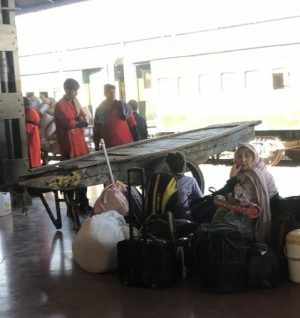
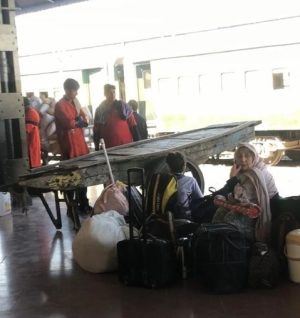
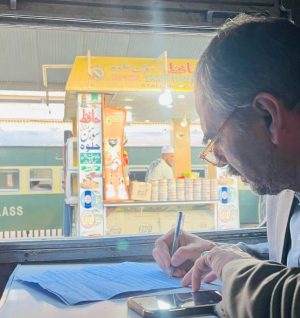
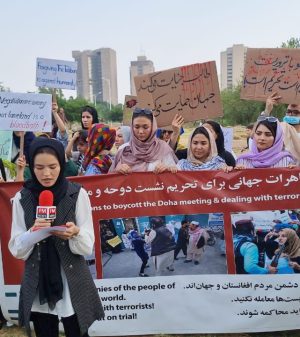
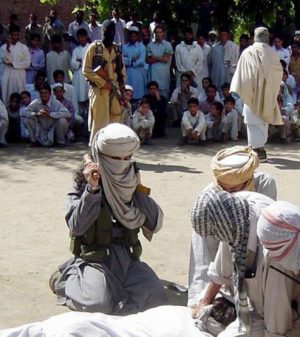
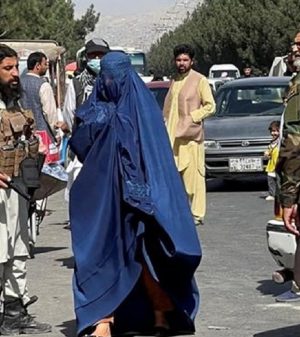
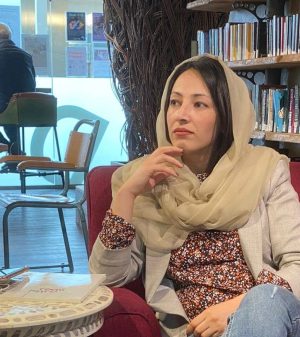
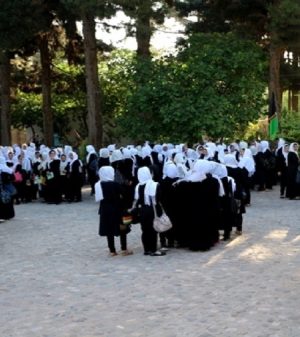
Add Comment